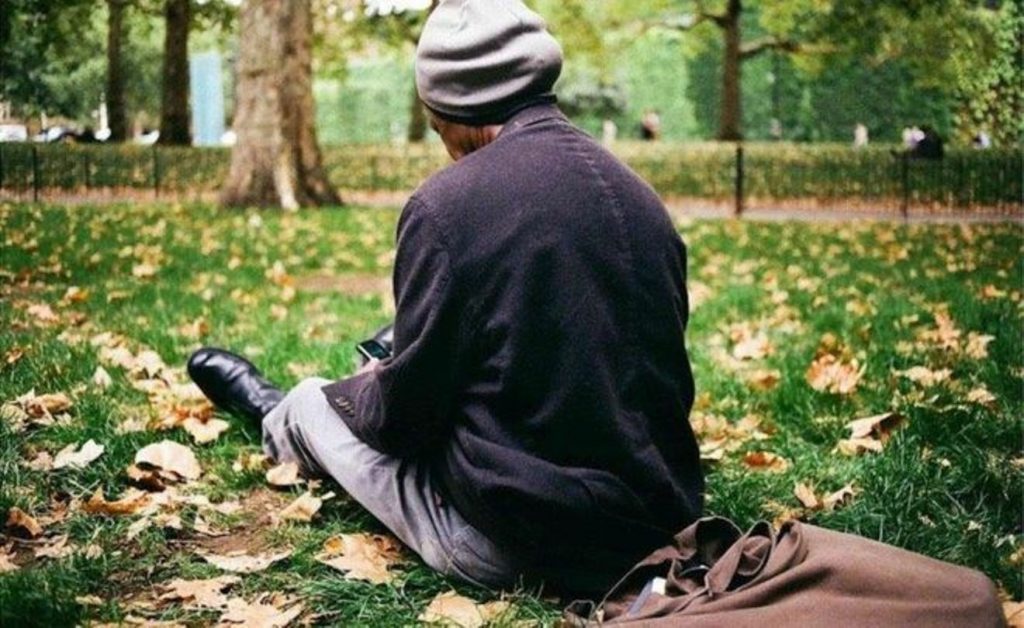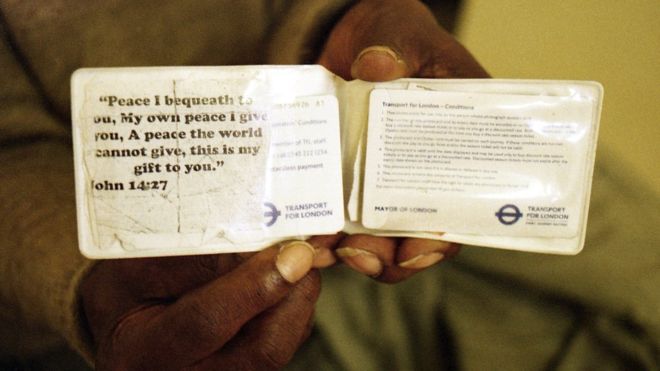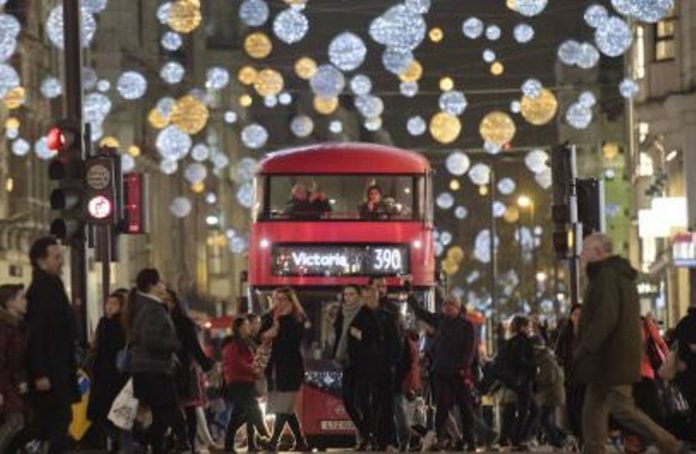For more than two decades after his asylum application was rejected, Sunny found a safe haven aboard the buses that zigzag across London at night. What’s it like to spend every night on the lower decks? Sunny waits patiently, wind penetrating his well-worn jacket and the winter cold biting at his extremities.
It’s past midnight and his legs are weary but he stands firm and smiles as the bus lunges to a halt, its wing mirror clipping overgrown branches on its way. He moves aside to let other passengers board, greets the familiar face of the driver with a gentle bow of the head and taps his weathered Oyster card on the payment point.
Relieved at finding his favoured spot at the back of the lower deck empty, he slides into place and gets comfortable for the long ride ahead. Sunny hugs his bag to his stomach, feels his wrinkled hands start to thaw, and closes his eyes. Leaving behind the smell of fried chicken and noise of London’s late-night traffic, his mind drifts. He sees his younger self, kneeling in prayer between the concrete walls of a Nigerian prison, waiting to be executed. His offence: struggling for democracy.
ALSO READ: Homeless Americans to live in ‘Government Facilities’ A guard barges into the cell, lifts him to his feet and rushes him down silent corridors, out into blinding sunlight, where a car is waiting.
Family and friends have bought his freedom, paying off everyone from the prison officials to the air hostess on the flight to London. Sunny is jerked back to the present as a scrum of drunken men, singing tunelessly, trail through the doors and up to the top deck. It must be three or four in the morning, he calculates – the usual hour for trouble.

PHOTO: BBC Around this time, Sunny often notices three distinct groups around him.
It’s a neat survey of modern London. There are those who came to this country for a better life, rushing to their pre-dawn cleaning jobs. Another group – mostly indigenous Britons – heads home from the nightclubs, talking loudly and cramming down fast food.
And finally there are the homeless, those who have nowhere else to go, for whom buses are a place to rest. Sunny doesn’t resent the others; he has learned to enjoy their boisterousness. When they smile, he smiles. When they laugh, he laughs too.
It’s amazing how a few pints can evaporate class boundaries, stripping reserved Englishmen of their inhibitions so they chat with the homeless as temporary equals. Sunny tries to recall the last time he felt as happy as these drunken men. Perhaps it was when his asylum claim was still under review. Back then he was full of gratitude for his second chance at life.
He took a course in documentary-making, choosing to report on the lives of London’s homeless, never imagining he would soon be in their shoes. Sunny had dared to hope for a bright future, safe under the protection of Her Majesty the Queen – that figurehead familiar from sun-faded colonial posters across Nigeria. But his request for asylum was refused. That left him with two options: go home to a country under the iron fist of a military ruler, where his death sentence would finally be carried out, or go underground.
READ ALSO: Nigerian facing deportation commits suicide in U.S.
It wasn’t a difficult choice. And so began 21 years as a nomad on London’s buses, which Sunny quickly realised were safer and warmer than the streets. It was a church minister, a woman of unwavering generosity, who first bought him a monthly pass to save him multiple nightly fares. She continued to do so, month after month, and other friends would chip in if she wasn’t around. Sunny’s travel card holder quotes Jesus: “Peace I bequeath to you, My own peace I give you, A peace the world cannot give.”

PHOTO: BBC By day Sunny would volunteer at churches – he would attend several during his time in London.
When his work was done, he would often head to Westminster Reference Library where he could catch up on the day’s news or pick up where he’d left off in the book he’d been reading. He might then ask a restaurant manager if they could spare some food, and says he was rarely turned away. But no later than 9pm he would invariably be stepping aboard a bus for the first of three, maybe four, nightly trips across the capital. He soon discovered the best buses for a good rest.
There was the trusty N29, from Trafalgar Square to the northern suburb of Wood Green. But the 25 – which ran 24 hours – offered the longest uninterrupted sleep. In traffic, it would take two hours to get from central London to Ilford, in Essex, where – if he was really lucky – a driver might take pity and leave him sleeping on board at the terminus. More often, the homeless passengers – maybe four or five of them – would be woken and turfed off until the next driver arrived. Most were destitute women, British or African, who used the bus as a sanctuary from the threat of sexual assault.
Laden with bags, they would be grateful for Sunny’s help lugging them on and off the bus. Sunny always travelled light. A small tote bag allowed him to avoid the stigma of homelessness during daylight hours. Some homeless folk would stretch out across seats but he preferred not to inconvenience other riders. ICYMI: Wanted: Girlfriend to fly to the Moon with Japanese billionaire It took a while to learn all the tricks.
At first, he hadn’t worried about where to sit. But then he found himself in a confrontation with two men who had been trying to set light to the hair of an unsuspecting woman in front. He chased them off but resolved to avoid conflict where possible. The lower deck, he concluded, was the preserve of reasonable people, of families and the elderly. Trouble rarely erupted so close to the driver.
The back seats were optimal, not just for the headrest but for peace of mind. But there were always distractions: the lurching bus, the neon lights, the noisy night-riders and the humming engine. Two hours of proper sleep across an entire night was an achievement. At dawn – or when he got hungry, whichever came first – he would head to a McDonald’s.
He never begged but the friendly staff at the Leicester Square branch would give him food and let him shave in the bathrooms. Fellow customers could be kind, too. Or, if he timed it right, he could hop off at the 24-hour branch in Haringey – halfway along the N29 route. There, he could enjoy a peace that was rare in the central London branches, rest his head on a table and continue his slumber. For a handful of Christmases, Sunny broke his routine and tried winter night shelters provided by churches.
Seven different churches worked a rota. But they were scattered in different locations across the capital, creating a daily exodus of people – the “walking dead”, in his words – trying to reach their next bed before the evening curfew. Sunny came to realise he preferred the bus to lying on stone floors, packed shoulder-to-shoulder.
It was hard to sleep through the smell of tobacco, alcohol and unwashed bodies. And, of course, the screams of the others as they lay there tormented by nightmares. From the seats of London buses, Sunny watched the changing face of the capital. Slowly, the white population declined as a proportion of the total.
The ranks of the homeless expanded. In this most diverse of spaces, he became adept at matching faces or dialects to places of origin. And he developed a sixth sense for trouble, detecting warning signs in gestures: the smirk of trouble-making teens, the pursed lips of an explosive racist.
There were combinations that could result in confrontation: drunken football fans and a veiled woman; tired commuters and people using speakerphone; gang members and their local rivals. In the months following the Brexit referendum of 2016, hostility to migrants seemed to become more commonplace. “Go back home,” became a regular refrain. Sunny didn’t blame the British government for his predicament. Had his own country’s not been so bad, he wouldn’t have been here in the first place.
ALSO READ: Lagos: 689 dead, over 250 injured in 1,500 Okada, tricycle accidents within 4 years ― Reports Eventually, the refugee centre at Notre Dame de France church, off Leicester Square, made an application for leave to remain on his behalf.
If people prove they have continuously lived in the UK for 20 years, they can qualify to settle. But Sunny had spent that time avoiding all records, evading detection. How could he demonstrate he had been there all this time? “I understand that your client is currently homeless, but we still require documentary evidence to show continuous residence from 1995 to the present date,” said a letter from the Home Office. “Evidence such as utility bills, bank statements, tenancy agreements…” Sunny asked the friendliest bus drivers to write him a letter of support. One obliged, confirming he was “a regular rider throughout the night”.
The churches he had volunteered at over the years provided supporting statements and dug out old photographs recording his presence at charity events. These days Sunny is the one taking pictures. He reaches inside his bag for the disposable camera he’s been given to tell his story as part of a photography project.
There are a few frames left. Lifting the viewfinder to his eye, Sunny pushes firm against the flash button and pauses to adjust his composition. Click… He releases the shutter. The photograph will not simply show rows of mostly empty seats on the lower deck of a bus. It will be a picture of life as a free man. At the age of 55, in 2017, Sunny was granted leave to remain. It had taken a year but finally, he had the right to shelter, to work, to exist. And he was thankful.
It is almost his stop, deep in south London’s suburbs – he still isn’t used to travelling to a destination. Even now he sometimes sleeps on buses, though more often during the day rather than at night. For so long a sanctuary, they remain a place to empty his mind – their familiarity a comfort. Sunny’s knees click as he hoists himself up.
He’s getting older, his struggle has aged him beyond his years. He thanks the driver and carefully steps down to the pavement. Leaning into the breeze, he walks towards his bedsit, smiling as the cold cracks his lips.
Sunny, whose name has been changed, collaborated with photographer and journalist Venetia Menzies to document his story for one year. This story is drawn from interviews with Sunny, his own photographs and portraits that preserve his anonymity.
BBC

Putting a spotlight on business, inventions, leadership, influencers, women, technology, and lifestyle. We inspire, educate, celebrate success and reward resilience.















